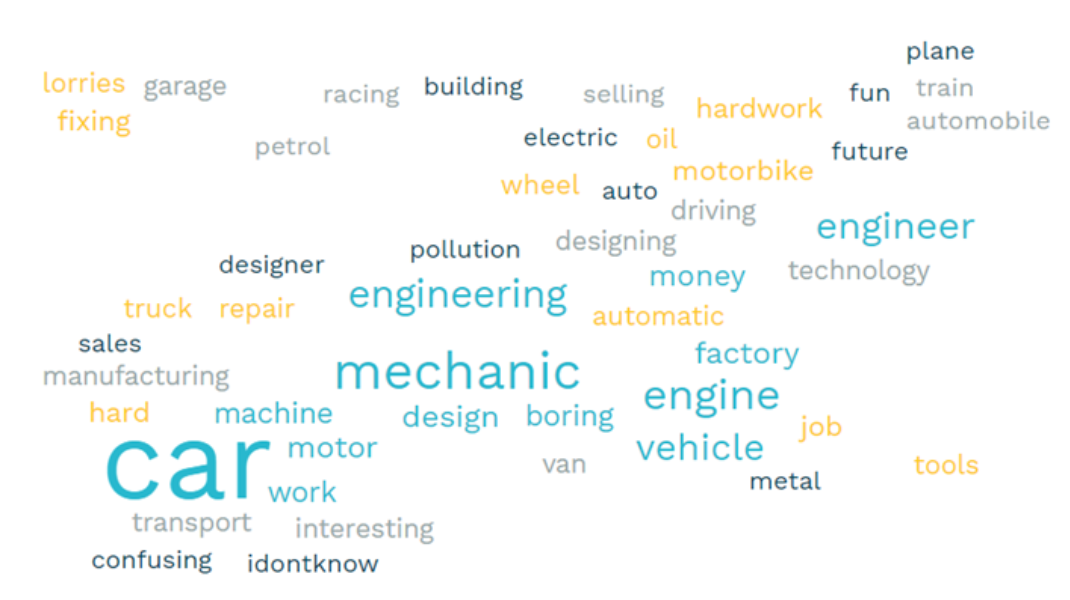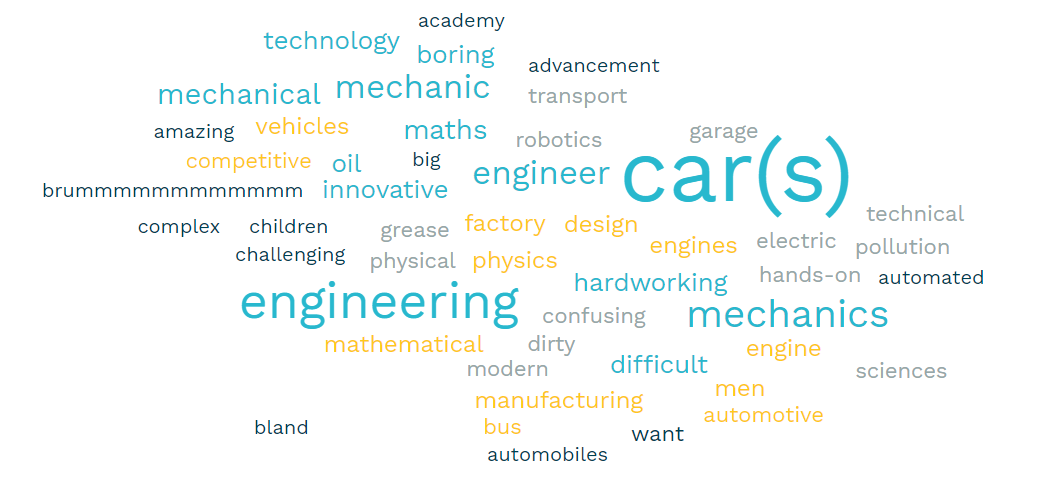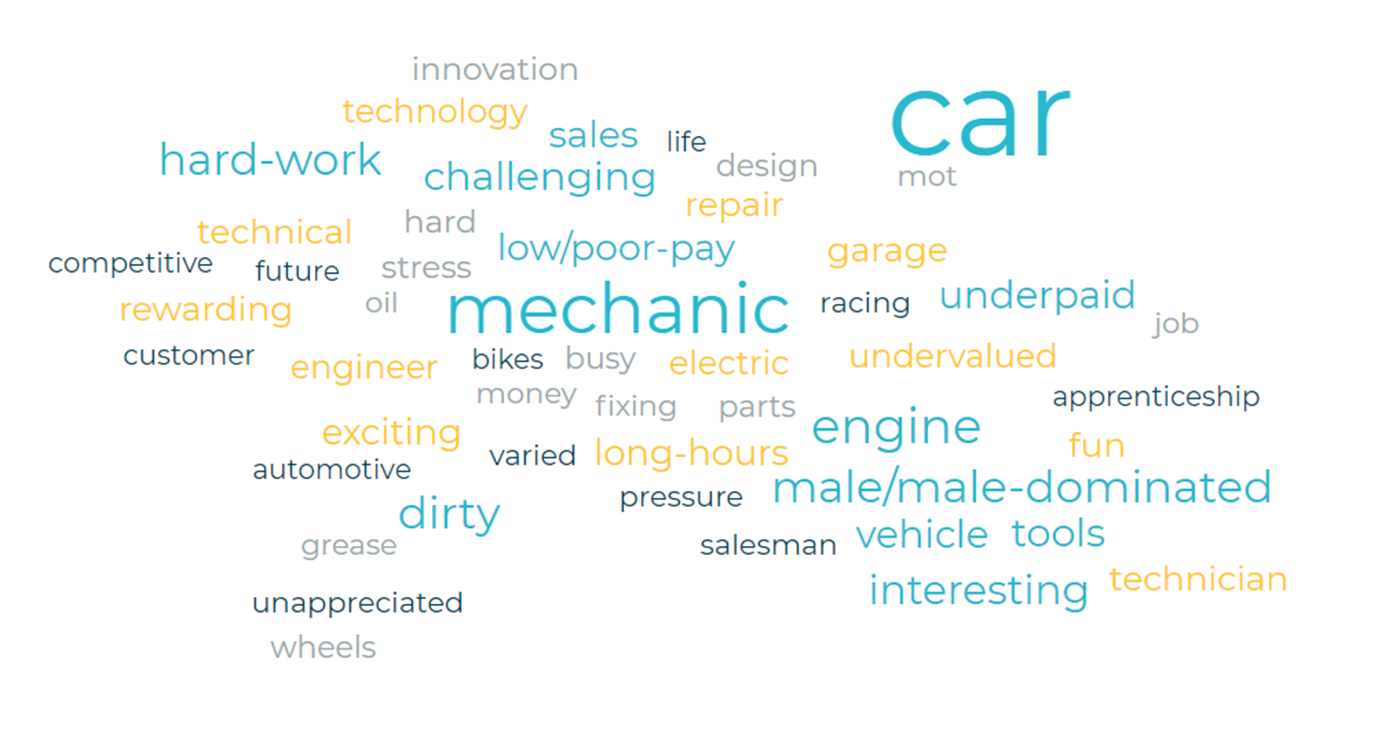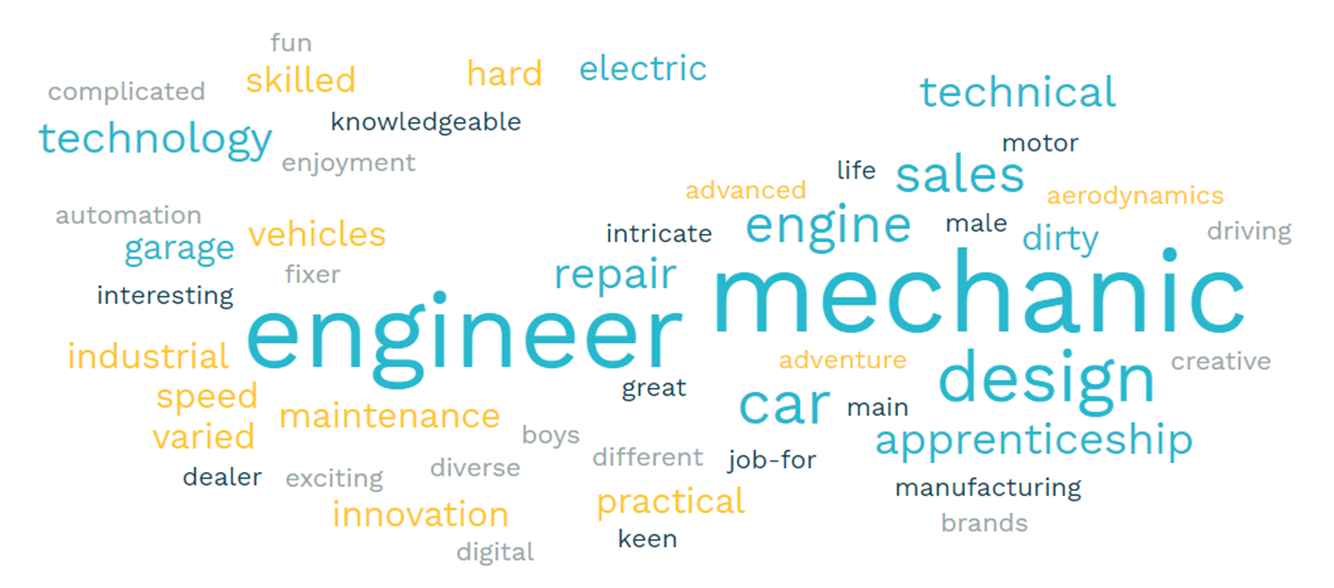Strand 1 - Children and young people
The Perception of the Automotive Sector survey was completed by over 1,600 school-aged children and young people from over 16 schools and colleges1.
Key Stage 2 (Ages 7-11)
For this age group, ‘dream jobs’ are based around interests and hobbies:
To become a footballer is the most popular, with 17% of respondents in this age group outlining it as their dream job. Jobs working with animals (13%) and teachers (9%) were also popular dream jobs. Artistic activities feature highly, with many outlining that they would like to act, sing, paint, write and take photographs. In terms of automotive, Formula 1 and racing were outlined by several respondents. Other automotive professions mentioned were car dealer, car mechanic and car designer.
Of the three key words outlining how they feel when imagining themselves repairing a car, frequent words have negative connotations, with words such as tired, bored, annoyed, and frustrated mentioned:
‘Dirty’ is also mentioned frequently as well as ‘danger’ words such as nervous, worried, and scared. There were however three positive words highlighted: happy, excited, and fun.
The general view seems to be that fixing cars is difficult, but selling them is not. There are differences when comparing a respondent who knows someone in the sector and those who do not. A larger proportion of those who know someone in the sector believe it is easy to fix a car, and a larger proportion also believe it is easy to race a car.
Knowing someone who works in the sector has a positive impact on perception of a career in the sector. Having a family member working in the sector was stated by many as the reason they want an automotive career.
“I have always been inspired fixing cars and other types of vehicles when I was little and to now.”
“Grandad and daddy work with cars.”
“Maybe because my dad is a recovery driver so he drives lorries to cars that have broken down so I may like it.”
Reasons for not wanting a job in the sector include, other job aspirations based around current interest and hobbies, and no interest in cars. Other potential barriers are the perception that it is boring and also that is dirty, messy and dangerous.
“I want to see blood not grease.”
“I am not into that type of thing and it sounds boring!”
“I will get messy and will need to have a bath.”
“I don’t like working with vehicles unless they will be space rovers.”
Key Stage 3 and 4 (Ages 11-16)
Those in Key Stage 3 and 4 are particularly concerned with wanting to make the world a better place, highlighted by comments about improving the environment, better safety in the automotive sector and on vehicles, and a desire to help people. Care professions, such doctors and nurses, are very popular career choices.
As with Key Stage 2 students, job aspirations remain focussed around interests, hobbies and passions:
More ‘career’ focussed options begin to emerge, based around school subject preference, such as scientist, engineer and architect. Automotive professions are: mechanic, car designer, test driver, supercar sales and car sprayer. Formula 1 and racing was also listed by several respondents.
Of the three key words that come to mind when thinking of a career in the automotive sector, most frequently mentioned words are focussed on the perceived ‘logistics’ or ‘practicalities’ of roles in automotive. Engineering and engineer feature highly, as well as hard work, and boring:
The creative aspect of the sector, such as design and innovation, is a potential attraction to many. Many outlined that the best things about a career in automotive were: helping people, improving safety, creating, and working with new technology, pay, and finding ways the sector can help the environment. Creativity and designing vehicles were also highly thought of.
“I think it would be cool to design and create new vehicles.”
“Fixing cool cars and making people happy”
“Ensuring vehicles are safe and therefore saving lives.”
“Coming up with new designs for more sustainable and eco-friendly cars.”
Core themes for reasons to stop them joining the sector were the perception of it being a dangerous job and that it is dirty and messy. Pay was also mentioned in this age group. The perception is that it is not well paid and that it involves long hours. Environmental factors, and not wanting to contribute to pollution, also featured in this age group. There is also particular mention by a number of respondents about not wanting to “do maths”.
“It probably doesn't pay amazingly and I think there are quite cramped working areas. Also, unless it is an electric factory then in would have a negative impact on the environment.”
“Cars are bad for the environment and I could be doing something more worthwhile like being a scientist.”
Just under a third (32%) of respondents said they believe that a Level 3 qualification is needed to work in the sector, and 31% said they believe automotive pays well.
Knowing someone in the sector has a positive impact on perception of a career in automotive and increases the likelihood of recommending it to a friend. Respondents here are more likely to consider automotive as a potential career option, and believe that it pays well.
Those whose school is outside of Hertfordshire are more likely to think of automotive as a potential career option, that it pays well and to recommend it to a friend.
Key Stage 5 (Ages 16-18)
Almost half of respondents had a clear idea of their plans post-18. More than half of respondents stated that they planned to go to university. Around 11% were able to state their career aspirations, while 6% outlined that they wanted a job or to earn money, and 10% had no plan. Others mentioned taking a gap year, and 8% mentioned an apprenticeship.
Many young people in this age group do not believe they are influenced by others in terms of career plans, but that they make their own decisions. Also, subject study choice is important when considering career paths, with many outlining that their current subject choice would not support a career in automotive.
Of the three key words that come to mind when thinking of a career in the automotive sector, core themes are similar to Key Stage 3 and 4, with engineering and engineer featuring highly:
Maths also features highly. Negative words such as boring, difficult, and hardworking feature highly.
Only 16% of respondents have considered the automotive sector as a career choice. When asked why not, responses included “not interested” or “have other interests that I would rather pursue”. Others mention the subjects they are currently studying and a perception that maths is a requirement. Some have never thought about it or do not know about the sector.
The following quote from one female student is interesting:
“I never understood much about the automotive industry, only ever about the use of cars and the practicality behind their use. My current perception as a female student is that the automotive industry has seemed like a heavily male tailored field where diversity and equality have not been heavily encouraged, often the stigma of it being a "boy's toy" has unconsciously been embedded within me so I never considered it as an option.”
Perceptions of the sector being male dominated and potentially sexist are mentioned by a number in this age group.
“The automotive industry is one of the most famously male-dominated work environments.
Seriously, a huge turn off.”
Only 6% considered automotive when they did work experience.
Perceptions of salary are interesting, with 61% of respondents expecting a qualified automotive technician to earn more than £31,000, which is higher than the true average of £26,000 to £30,000.
45% of respondents said they believe you need Level 3 qualifications to work in the sector.
The best things about a career in automotive were stated as creating and designing vehicles, that the work was ‘hands-on’, and that it could be interesting work.
Strand 2 – Personal Influencers
The survey received a total of 387 responses2.
When thinking about young people they know and influence, 68% of respondents believe a career in the automotive sector is a viable option for them. Those who work in the sector, and those who know someone in the sector, are more likely to view it as a viable option for the young person in their sphere of influence.
Of the three key words chosen to outline thoughts on the sector, many had negative connotations:
Dirty is the fourth most mentioned word; male and male dominated is the fifth most mentioned word and if we combine underpaid and low paid/poor pay, then this would be the third most mentioned word(s). One positive word mentioned was ‘interesting’.
For those already connected to the sector, technology is a key theme outlined as the best thing about a career in automotive. In particular, the new and changing technology, as well as being at the cutting edge of this change.
“We are right at the forefront of a massive technology shift that will change automotive and supply chains across the industry. What’s not exciting about being a part of that.”
Those who know someone in the sector were able to highlighted the type of work the career offers, such as hands on, practical and the opportunity to work for oneself. Sustainability was stated as the best thing about a career in automotive by those who don’t know anyone the sector, in that there is likely to always be a need for vehicles and for those who work with them. They also mentioned the ability to fix/maintain their own vehicles as a benefit.
Low pay and long hours are highlighted by those in the sector and those who know someone in the sector as the worse things about automotive. Those who don’t know anyone in the sector highlight that they thought it was male dominated which was a negative aspect to a career in the sector.
Those who do not work or know anyone in the sector are more likely to think that you need qualifications to work in the automotive sector.
28% of respondents believe those who work in the sector are poorly paid, however this does vary depending on history/knowledge of the sector, as those who do not work or know anyone in the sector are more optimistic about pay, with 19% believing it to be well paid.
Confidence in giving advice about the sector varies; with those who do not work or know anyone in the sector are significantly less confident, this group are also not aware of where to go to get information.
17% of respondents said that the gender of the young person they were advising would influence the advice they would give. It does appear that those not working or know someone in the sector have a perception that the sector is less inclusive than those who do work or know someone in the sector.
In terms of specific reasons why respondents would not recommend the automotive sector as a career choice, key themes continued to be: pay and conditions, long hours, hard work, being undervalued for skill-set and sexism. Also, not understanding enough about the sector was a key theme for those who do not know anyone in the sector.
Strand 2 – Careers Influencers
Respondents3 gave relatively high scores for their likelihood of recommending or advising a career in automotive, but were keen to point out that this is dependent on the individual and their interests. Positively, the vast majority of responses showed that there was no specific reason to not recommend a career in automotive. However, some responses did mention not recommending an automotive career to those who lacked maths ability. Some responses also highlighted a lack of information and lack of local placements.
When asked to outline three key words, respondents gave very factual words that describe the actual role like mechanic, engine and car:
Non-technician roles were mentioned; such as design and sales. Apprenticeship is the 7th most mentioned word. Technical and technology also feature in the top 10.
Technology is outlined as the best thing about a career in automotive, in particular the new and changing technology and innovation. Another theme is skills, and the opportunity to learn lots of different skills. Also, that working in the sector opens career opportunities.
“The fact it is changing at a fast rate, new innovations and technology coming out, new skills to be learnt.”
One core theme outlined as the worst thing about a career in automotive was the working environment. These comments are very much aimed at technician roles. Another core theme is pay and conditions:
“Being in the wrong working environment, that was not safe to work in.”
“Undervalued, sometimes cold environment.”
Respondents appear to have a good understanding of the qualifications required and that it is highly dependent on what role an individual is pursuing. They also understand the salary expectations.
Respondents gave an average to low score in terms of their confidence in giving advice about a career in the automotive sector and its job roles. However, they were able to outline core information sources and good examples.
Over a third of respondents believe that young people are most receptive to careers information in year 7, 8 and 9, and that they are most receptive to information face-to-face, such as meetings and events.
The research and outcomes reflect the careers guidance theory; Gottfredson’s Theory of Circumscription and Compromise (1981)4 which explains that children progress through four stages of career development:
- Stage 1 (ages 3 – 5) Orientation to Size and Power where children see jobs as held by grown-ups.
- Stage 2 (ages 6 – 8) Orientation to Sex Roles where children see certain jobs as appropriate to whether one is male or female.
- Stage 3 (ages 9 – 13) Orientation to Social Valuation where children are sensitive to prestige and status and bring this attachment to certain types of jobs. At this time children begin to eliminate some jobs because they do not fit their idea of an appropriate job based on the child’s sex or level of prestige desired.
- Stage 4 (ages 14 and older) Orientation to Internal Unique Self where adolescents begin to consider their interests, abilities, and values surrounding the type of job they desire. However, at this final stage many occupations have already been ruled out at previous stages.
It is important that young people are intentionally exposed at primary level to a wide variety of career activities, and that these highlight non-traditional roles, as well as introduce non-traditional career role models.
Personal influencers need clear information on automotive opportunities. Positive role models can help challenge stereotypes, for example, around gender, pay and working environment.
Research shows that careers influencers would benefit from support for face-to-face careers advice and information. As a sector, we also need to do more to challenge the assumptions around working environments.










